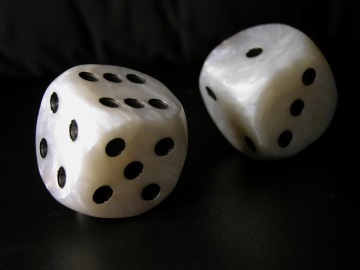
Signature: Barbudi, easy to play, features miniature dice and up to 12 people can play. Because the odds for the shooter and fader are 50 percent, payouts can be ample when played outside of a casino or club, as the house doesn’t take a cut. When it’s played in a house, its cut typically is between 3 and 5 percent of the wagers.
“One of the attractions of the game is its no limit aspect. You can bet a million. The house simply takes its percentage, win or lose,” the Nevada State Journal reported in 1965.
Origination: This dice game originated in Greece, reportedly around 450 B.C.
How It Works: Each player throws a die. The one with the highest number becomes the shooter, and the player to his right becomes the fader. Play rotates counterclockwise.
If the fader chooses to wager, he/she puts up a stake. The shooter matches part or all of the bet, and the other players, in turn, may cover what is left or make side bets with one another as to who, the fader or shooter, will win. The shooter or fader may decide not to bet at all; if that happens, the dice are passed to the next players.
First, the shooter throws two dice then the fader does. They continue to alternate turns until one of them throws a winning combo: 3–3, 5–5, 6–6 or 6–5. Losing combos are 1–1, 2–2, 4–4 or 1–2. When any other combination appears, the opponent takes their turn.
As long as the shooter wins or loses with a 1-2, or the fader wins with a 5-6, the players’ roles remain unchanged for the next round. Otherwise, the fader becomes the shooter, and the next player becomes the new fader.
Trivia: In 1965, barbudi was introduced to Reno, Nevada by C. Mathias “Matt” Skender at the Barboot Coffee House and Casino, which was given the first gambling license for the game in Nevada. However, the enterprise lasted only a few weeks because the game or the club (or both) didn’t catch on.
Current Status: Barbudi, common among certain groups such as Greeks, Turks, Basques and Jews, is played in Eastern Europe, Mexico, Canada and the United States. In some regions, it’s called even-up craps.
